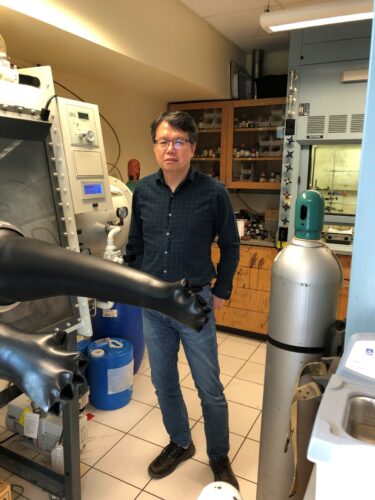Marquette chemistry professor receives $527,000 NSF grant to study green catalytic methods
MILWAUKEE — Dr. Chae Yi, professor of chemistry in the Klingler College of Arts and Sciences at Marquette University, has received a $527,182 grant from the National Science Foundation to study new methods to upgrade petroleum and biomass-derived commodity chemicals into value-added materials using environmentally sustainable catalytic processes.
The studies, with support from the Chemical Catalysis Program in the NSF’s Division of Chemistry, could lead to economic and environmental improvements in the preparation of complex organic molecules needed for the manufacture of pharmaceuticals and other valuable products through fundamental advances in the field of catalytic bond activation.
“I am thankful to the NSF and its Chemical Catalysis Program for this award,” Yi said. “This study aims to develop novel catalytic coupling methods by using biomass-relevant substrates, which are readily available, to attain detailed mechanistic knowledge on these catalytic methods, and then to utilize these methods for sustainable synthesis of complex organic molecules of pharmaceutical importance.”
The study will be carried out in two parts, with Yi’s lab first investigating the scope and mechanism of the catalytic coupling methods via unreactive carbon-carbon bond activation of saturated hydrocarbons and their applications to the synthesis of complex organic molecules. Then, researchers will focus on the development of novel catalytic coupling methods via carbon-nitrogen bond activation for simple amines and related nitrogen substrates.
This research project will have broader impacts, as it will support summer internships that will allow for undergraduate students from local college STEM programs to receive research experiences in Yi’s laboratory. Yi will also be afforded the resources to engage in outreach efforts at local high schools and colleges that will serve to promote careers in science and engineering for students with diverse backgrounds, many of whom belong to groups underrepresented in the current STEM workforce.
The NSF’s Chemical Catalysis Program supports experimental and computational research directed towards the fundamental understanding of the chemistry of catalytic processes. The CAT Program accepts proposals on catalytic approaches, which facilitate, direct, and accelerate efficient chemical transformations. The program scope includes the design and synthesis of catalytic species on the molecular, supramolecular, and nanometer scales as well as mechanistic studies primarily focused on discovery, development, or improvement of homogeneous and heterogeneous catalytic processes.
NOTE: This press release was submitted to Urban Milwaukee and was not written by an Urban Milwaukee writer. While it is believed to be reliable, Urban Milwaukee does not guarantee its accuracy or completeness.
Recent Press Releases by Marquette University
New Marquette Law School Poll finds large majority of Wisconsin voters not yet tuned in to who is running in major 2026 elections
Oct 29th, 2025 by Marquette UniversityNo candidate has established strong position in public favorability in governor, state Supreme Court races; large majorities of voters undecided
New Marquette Law School National Survey Finds Large Majority Think Political Violence is a Big Problem, But With Sharp Partisan Differences
Oct 1st, 2025 by Marquette UniversityAmericans are overall pessimistic on reducing intense political conflict; half of those polled say heated language by leaders makes violence more likely























